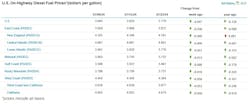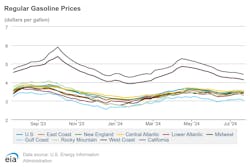The U.S. Energy Information Administration found that diesel prices fell across the country over the past week, with the national on-highway diesel fuel price average dipping 4 cents to $3.779 per gallon on July 22. The rest of the country saw diesel prices drop from less than a cent in certain subregions to 9 cents overall, potentially due to current refinery overutilization. The Gulf Coast saw the largest weekly price decrease.
On a regional basis, retail diesel prices fell the least in the Midwest and Rocky Mountain regions, with the Midwest seeing prices decrease 1 cent to $3.732 and the Rocky Mountain area almost 2 cents to $3.731 per gallon. Otherwise, the region with the next-smallest price drop was the East Coast, where diesel costs fell 3 cents to $3.872.
On the other side of the scale, diesel prices fell the most along the Gulf Coast, where prices dropped 9 cents to $3.461 per gallon. Prices also dropped 5 cents along the West Coast overall, the West Coast without California, and in California. This places the West Coast’s average diesel costs at $4.394, the West Coast without California’s at $3.977, and California’s diesel prices at $4.874 per gallon.
Thus, the Gulf Coast has the lowest diesel fuel costs, at $3.461 per gallon, while California has the most expensive.
In comparison, the AAA motor club found that the current diesel average for the U.S. was $3.828 per gallon, 5 cents more than the EIA’s numbers. This price is 3 cents less than this time last week and 5 cents less than the AAA’s records from this time last year.
According to Matt Muenster, chief economist at Breakthrough, this price plateau could be due to how the overall demand for diesel fuel for shipping and travel usually increases around this time of year, leading to refineries increasing production.
See also: Diesel prices halt rise at $3.82/gal, gas at $3.496/gal
“Because refineries wanted to produce more of those [fuel] products, their utilization rate was north of 95%, so they're operating near their maximum capacity and producing more diesel while they're doing it,” Muenster said.
However, even though this would typically have resulted in higher diesel prices since freight demand isn't at its peak, the increase in diesel supply has led to lower prices at the pump.
“There's usually not a particularly robust demand for diesel at this time,” the chief economist explained. “However, the supply of it is growing more rapidly because of refinery utilization.”
Gas prices remain below $3.50 for U.S. average
These influences, as well as a lackluster domestic travel demand, are also helping to drive down gasoline prices. This week, gas prices across the U.S. fell in all regions save for the Midwest. Nationwide, the average gas price is $3.471, down 2 cents from a week ago and 12 cents from this time last year, according to the EIA.
For the rest of the country, prices fluctuated from 1 to 5 cents, with costs in the Midwest rising 5 cents to $3.426 per gallon. Meanwhile, gas prices decreased the most in the Lower Atlantic subregion, where costs fell 9 cents to $3.304 over the past week. Among larger regions, the Rocky Mountain and Gulf Coast regions both fell 6 cents to $3.323 and $3.047 per gallon, respectively. Gas prices dropped the least in the New England and Central Atlantic subregions, each of which saw a price drop of 1 cent.
With all this said, the Gulf Coast is still the cheapest place for gas at $3.047 per gallon, while California is the most expensive at $4.428.
The AAA motor club’s gas average is higher than the EIA’s at $3.501 per gallon, a price 2 cents lower than last week and 9 cents lower than this time last year. According to the organization, this downward price pressure could partially be due to the heat waves impacting the U.S.
“The arrival of summer used to signal the start of a robust driving season, but that has not been the case recently,” said Andrew Gross, AAA spokesperson. “We know that a record number of travelers were forecast to hit the highways for the July 4 holiday, but since then, they appear to be staying off the road, and the recent scorching heat is possibly to blame. Maybe things will pick up soon.”
About the Author
Alex Keenan
Alex Keenan has been associate editor for Endeavor's Commercial Vehicle Group, which includes FleetOwner magazine, since 2022. She has written on a variety of topics for the past several years and recently joined the transportation industry, reviewing content covering technician challenges and breaking industry news. She holds a bachelor's degree in English from Colorado State University in Fort Collins, Colorado.


